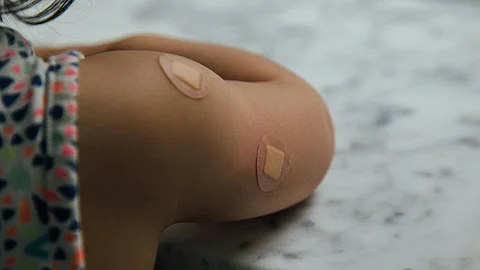

Children born by caesarean section need two doses of the measles vaccine to ensure robust protection against the disease, according to a recent study by the University of Cambridge and Fudan University. According to the study, infants born by C-section have a 2.6-fold higher chance of experiencing a single dose of the measles vaccine being ineffective than children born vaginally.
The study, published in Nature Microbiology, found that 12% of C-section babies did not develop an immune response to the first dose of the measles vaccine, whereas only 5% of vaginally delivered babies failed to respond. This failure means these children remain susceptible to measles, as their immune systems do not produce the necessary antibodies to fight the infection.
Researchers attribute this difference to the development of the infant’s gut microbiome. Babies born vaginally receive a greater variety of microbes from their mothers during birth, which helps boost their immune systems. In contrast, C-section babies miss out on this microbial transfer, which might delay the development of their gut microbiome and, consequently, their immune system's ability to respond to vaccines.
Professor Henrik Salje from the University of Cambridge’s Department of Genetics, co-senior author of the study, emphasized the long-term consequences of birth methods on immunity. He noted the importance of ensuring that C-section babies receive their second measles jab, as their first dose is more likely to fail. Salje stressed that many children do not receive their second dose, which poses risks both to individual health and public health.
Measles is highly contagious and can lead to severe complications such as blindness, seizures, and death. Before the introduction of the measles vaccine in 1963, the disease caused approximately 2.6 million deaths annually. Despite the availability of the Measles, Mumps, and Rubella (MMR) vaccine through the NHS Routine Childhood Immunisation Programme, the UK is falling short of the 95% vaccination rate required for herd immunity. As of 2022, only 83% of children worldwide had received their first dose of the measles vaccine by their first birthday, the lowest rate since 2008.
The study analyzed data from over 1,500 children in Hunan, China, tracking their immune responses from birth to age 12 through regular blood samples. This detailed data allowed researchers to observe changes in measles antibody levels over time and following vaccination.
With increasing numbers of C-sections globally accounting for one-third of all births in the UK and over half in countries like Brazil and Turkey, the findings are particularly relevant. In the UK, 39% of all deliveries in 2022/23 were by C-section, with even higher rates among older mothers.
Dr. Mary Ramsay, director of immunization at the UK Health Security Agency, emphasized the importance of the second MMR dose for full protection. The first dose is typically administered between 12 and 13 months of age, with the second dose given between three years, four months, and five years old.
Adam Finn, Professor of Paediatrics at the University of Bristol, called for further research into the immune responses of C-section babies. He noted that previous studies also suggested stronger immune responses in babies born vaginally or who are breastfed. Finn emphasized that in order to ensure effective immunization measures, it is critical to comprehend and address the variations between C-section rates and other medical conditions.
(Input from various media sources)
(Rehash/ Susmita Bhandary/MSM)
